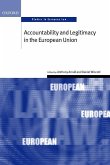It is actually axiomatic that a European Union in possession of increasing powers must be in want of legitimacy. At least this is what seems to be the case if one has a look at the scholarly attention which has now been directed towards this subject for more than half a century. Unlike a plenty of texts on this problematique, this work addresses the issue in its complexity and integrity unveiling several dimensions of legitimacy at once Legitimacy in respectively of the European Union unzips, therefore, such underlying academic and political taboos as: Legitimacy can only be obtained by the nation- states'' regimes; there is no democracy beyond the nation-state; there is no legitimate governance beyond the nation-state; indirect legitimation is sufficient to endow the European Union with (all) qualities of legitimized international respectively supranational actor; supranational input legitimacy of the European Union is not possible; the European Union cannot legitimize itself through its politics (any more). "Legitimacy in respectively of the European Union" is addressed to academic society and professional community all around the EUropean politics.
Bitte wählen Sie Ihr Anliegen aus.
Rechnungen
Retourenschein anfordern
Bestellstatus
Storno








